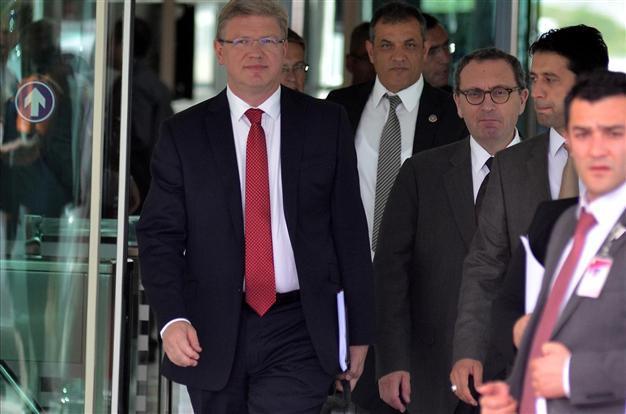Turkey, EU to talk over judicial reforms
ANKARA

EU Commissioner Stefan Füle arrived in Ankara for a two-day trip. AA Photo
Ankara and Brussels will continue to work on Turkey’s efforts to harmonize its legislation on issues concerning judiciary and fundamental rights along with criteria set in Chapter 23 during EU Commissioner Stefan Füle’s two-day trip to Ankara.Füle arrived in Ankara on June 16 afternoon. He will hold his first meeting with EU Minister Mevlüt Çavuşoğlu before being hosted over dinner by President Abdullah Gül.
Füle was also expected to meet with Prime Minister Recep Tayyip Erdoğan but a meeting had not yet been granted due to scheduling issues.
The working group on Chapter 23 (fundamental rights and judiciary) that was established by the EU Commission and Turkey will be held on June 17 with the participation of Füle, Çavuşoğlu and Justice Minister Bekir Bozdağ.
Chapter 24 (justice, freedom and security) and Chapter 23 are currently vetoed by Greek Cyprus even though these two are seen as essential chapters in negotiations for full EU membership.
A number of leading EU countries have been expressing their positive approach with the opening of these chapters, but they are still far from imposing pressure on Nicosia.
With Greek Cyprus continuing to veto these chapters, Ankara and Brussels agreed to form a working group to let Turkey set its criteria in the chapter.
The judiciary is one of the areas the Turkish government has long been criticized for and it has been urged by the EU to resolve judicial problems and to continue reforms in this field.
Following the meeting, Çavuşoğlu and Füle will meet with representatives of civil society and nongovernmental organizations to discuss the state of accession talks and the process of democratization in Turkey.
Turkey-EU relations have deteriorated since last year’s Gezi Protests when security forces brutally cracked down on protestors at the expense of violating fundamental human rights, such as freedom of expression and the right to demonstrate.
The EU’s concerns over Turkey’s democratic institutions deteriorated further following the government’s reaction to internal corruption and last year’s graft scandal, which resulted in the purge of thousands of police officers and judiciary and restrictions on Internet usage.
The EU harshly slammed the government’s decision to shut down Twitter and YouTube. Füle’s meeting is seen as an important opportunity for the EU to reiterate its concerns on these issues.
















